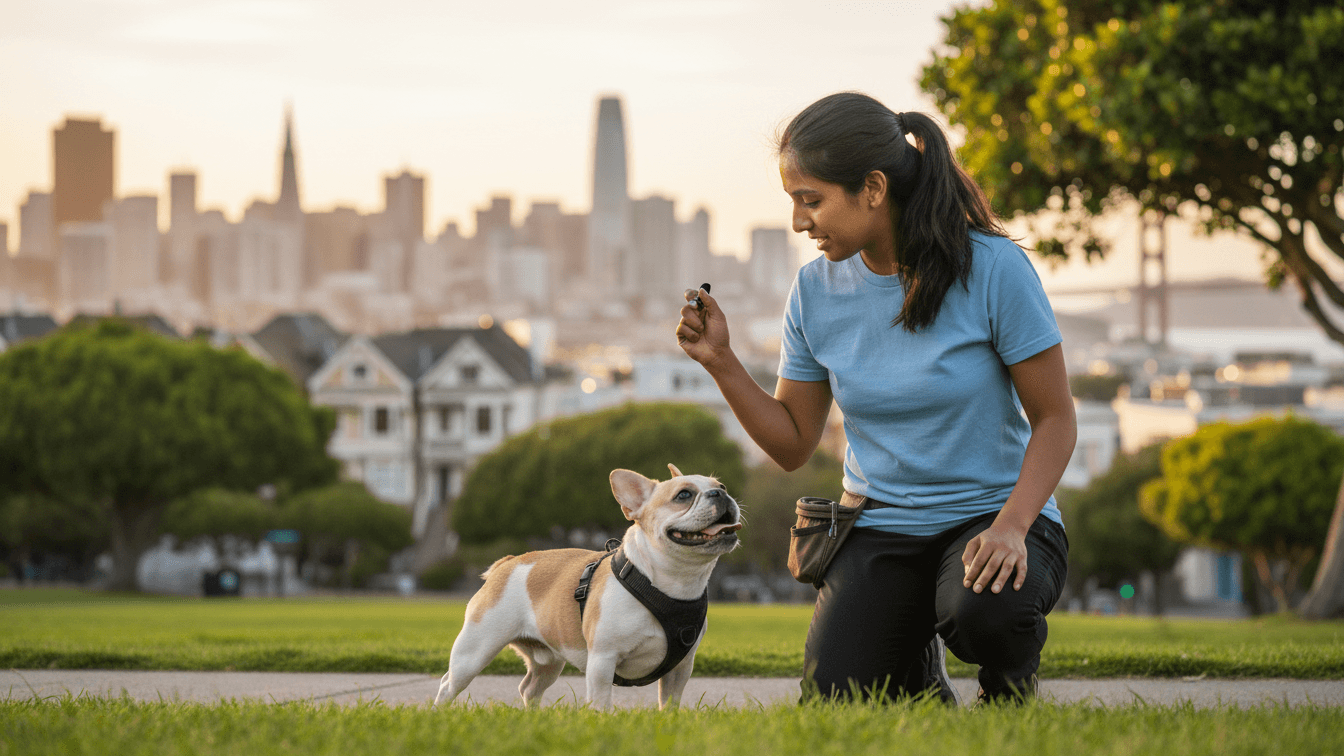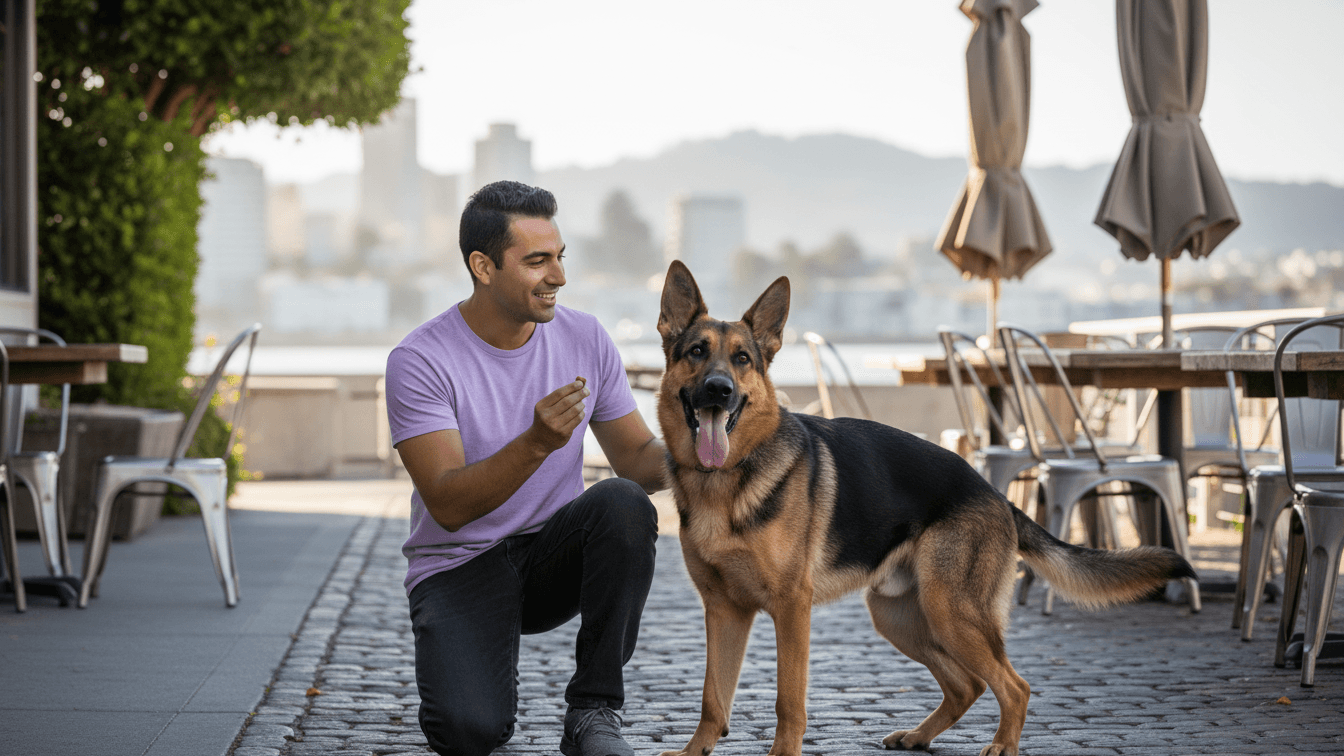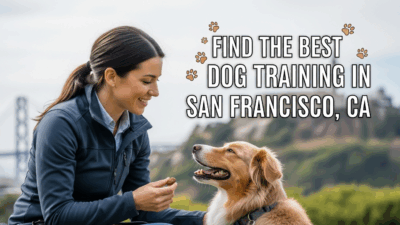Your Complete Guide to Choosing a Dog Trainer in San Francisco
Living with a dog in San Francisco means navigating steep hills, crowded sidewalks, cable cars, and packed dog parks from the Marina to the Mission. Your dog needs to handle all of this calmly, from loose-leash walks up Filbert Street to staying polite when tourists crowd around Dolores Park on sunny weekends.
Since San Francisco sits in San Francisco County, local rules follow both city ordinances and county health requirements. When you find a professional dog trainer who understands these local details, you’ll get better results both at home and out in your neighborhood.
How to Choose the Right Trainer
Start by looking for someone who uses positive reinforcement training and can set realistic goals for your San Francisco lifestyle. This means your dog should learn to walk calmly on busy Market Street, stay focused near off-leash areas at Fort Funston, and handle crowded Muni buses without drama.
Credentials give you a quick way to compare trainers’ experience levels. Common dog trainer certifications include KPA-CTP, CPDT-KA, or IAABC-CDBC for behavior problems. If your dog has serious aggression issues, look for someone with CBCC-KA or a science-based program like CTC.
In-home dog training works great for puppy training, door greetings, and neighborhood leash skills. Group classes make sense once your dog can focus around other dogs, especially before you try busy spots like Crissy Field or Alamo Square.
Common Dog Training Methods Explained

Reward-based methods build the trust you want while creating lasting behavior changes. They also help you follow San Francisco’s strict rules about keeping dogs under control in public spaces.
Basic obedience covers sit, down, stay, place, recall, and leash training so your dog can handle walks, outdoor restaurant patios, and park visits without pulling or jumping on people. These skills become especially important when navigating crowded neighborhoods like Hayes Valley or North Beach.
Puppy classes focus on socialization, potty training, bite control, crate comfort, and early leash skills. Starting with short, positive training sessions prevents bad habits from forming in the first place, which matters even more when you’re raising a puppy in a small San Francisco apartment.
Behavior modification addresses fear, reactivity, resource guarding, or separation anxiety through careful desensitization and counterconditioning. For serious cases, ask if your trainer works with local veterinarians or behavior specialists.
Private lessons and in-home services let you customize everything around your daily routines, while day training can speed up results when you’re short on time or dealing with a demanding work schedule.
Dog training classes help your dog practice good manners around other dogs and people. The best classes give dogs plenty of space, screen participants carefully, and teach calm behavior rather than just excitement.
Specialized training like therapy dog training or service dog training requires extra structure, public-access skills, and a very clear step-by-step training program. San Francisco’s diverse public spaces make excellent practice environments once your dog has solid foundation skills.
Stay away from trainers who use fear, intimidation, or pain to get results. Humane methods are safer for everyone, easier to maintain long-term, and much better for keeping peace with your neighbors in close-quartered city living.
Average Cost of Dog Training in San Francisco (Updated for 2025)
Prices around San Francisco depend on the trainer’s experience, how long sessions last, and where the training happens. Here’s what most local pet owners are paying in 2025.
| Service Type | Average Cost (San Francisco) |
|---|---|
| Puppy classes (4-6 weeks) | $200-$350 total |
| Group obedience classes (4-6 weeks) | $225-$375 total |
| Private lessons (60-90 min) | $150-$250 per session |
| In-home coaching packages (4-6 visits) | $600-$1,200 total |
| Day training (trainer works your dog + handoff) | $600-$1,200 per week |
| Behavior consult for reactivity/anxiety (initial) | $200-$350 |
| Board and train (2-4 weeks) | $3,000-$6,000 total |
You’ll probably pay extra travel fees for locations outside central neighborhoods, and expect higher rates for complex behavior work or aggressive dog training. San Francisco’s high cost of living means dog training services typically run 20-30% higher than surrounding Bay Area communities.
Make sure you understand what’s included, how the trainer tracks progress, and whether they offer a free consultation or free evaluation before you sign up.
Questions to Ask a Potential Dog Trainer
- What training methods do you use, and how do you keep sessions positive and low-stress?
- What credentials do you have, like CPDT-KSA or KPA-CTP? Do you keep up with continuing education?
- How will you customize the training program for my dog’s specific needs and our San Francisco lifestyle?
- Do you offer in-home visits, group classes, or day training, and which approach fits my goals best?
- How will we measure my dog’s progress and know when to add more distractions like street traffic or crowds?
- What are the total costs, including any travel fees, and what’s your cancellation policy?
- Do you carry liability insurance, and can you show me proof?
- For behavior problems, will you work with my veterinarian if needed?
- What should I practice between our training sessions to help my dog keep improving?
- Have you worked with dogs in high-density urban environments like San Francisco before?
Local San Francisco Rules and Considerations
San Francisco enforces strict leash laws and nuisance rules to keep parks and neighborhoods safe for everyone. The city also maintains specific regulations about where dogs can be off-leash.
Leashes are required in all public spaces except inside designated off-leash areas. Keep a standard 6-foot leash with you for city sidewalks, Muni transit, and community events. Retractable leashes are prohibited in San Francisco parks.
California law requires current rabies vaccination and a valid license tag for all dogs over four months old. San Francisco requires annual dog licenses, which you can obtain through San Francisco Animal Care and Control. Spayed or neutered dogs receive reduced license fees.
Excessive barking can be considered a nuisance under city noise ordinances, so work with your trainer on alert barking and separation anxiety before neighbors start complaining. This becomes especially important in apartment buildings and densely packed neighborhoods.
California doesn’t require special licenses for dog trainers, but certified dog trainers often carry liability insurance to protect themselves and their clients. If a trainer offers board and train services, they may need to comply with kennel licensing requirements.
San Francisco Recreation and Park Department manages all city parks and enforces specific rules about commercial dog training activities. Trainers conducting private lessons or group sessions in public parks typically need permits and proof of insurance.
The city’s Voice Control Permit Program allows well-trained dogs to be off-leash in certain areas if they pass a test demonstrating reliable recall and obedience skills. This can be a great goal to work toward with your trainer.
Local San Francisco Resources for Dog Owners
These spots give you great places to practice polite manners, work on recalls, and provide safe enrichment for your dog. Always follow the posted rules and etiquette guidelines.
- Fort Funston offers expansive off-leash areas with trails overlooking the ocean, perfect for practicing recall around other dogs and wildlife. This remains one of the most popular training spots in the city.
- Golden Gate Park Dog Training Area near the buffalo paddock provides a fenced space for off-leash work. The park also has designated off-leash hours in several other sections.
- Crissy Field East Beach allows off-leash dogs in specific areas and gives you excellent opportunities to build focus around joggers, kite-surfers, and tourist crowds.
- Dolores Park has designated off-leash hours and serves as a challenging training environment with steep hills, crowds, and constant activity.
- Lake Merced offers trails and open spaces where leashed dogs can practice loose-leash walking with fewer distractions than downtown neighborhoods.
- SF Dog offers resources, meetups, and community information for San Francisco dog owners looking to connect with others.
- San Francisco Animal Care and Control provides licensing services, lost pet resources, and information about local animal welfare regulations.

FAQs
How much does in-home dog training cost?
Most San Francisco trainers charge $150-$250 per in-home visit, with discounts available when you buy packages. Behavior problems typically start at the higher end of that range, and some expert dog trainers may charge more for complex cases.
Is in-home dog training worth it?
Absolutely, because you’re working on problems exactly where they happen. Your trainer can fix door manners, jumping on guests, counter-surfing, and window reactivity right at home, then step outside to practice leash skills on your actual neighborhood sidewalks and stairs.
Can you pay someone to house train your dog?
Yes, many trainers offer puppy programs that include potty training, crate routines, and daily schedules. Day training can speed up the process while teaching you how to maintain the progress, which becomes especially valuable in San Francisco apartments without yard access.
What is the 3-3-3 rule for dog training?
This is a helpful timeline for new or adopted dogs: expect about 3 days for your dog to decompress, 3 weeks to learn your routines, and 3 months to feel completely settled. Good training plans work with this natural adjustment period rather than rushing results.
How long will it take to reach my training goals?
Most puppies and friendly adult dogs show solid progress within 4-8 weeks if you practice daily. Fear, reactivity, or aggression typically requires several months of careful behavior modification with gradual increases in difficulty. San Francisco’s challenging urban environment may extend timelines slightly as your dog learns to handle more complex distractions.
What should I bring to group classes?
Pack a flat collar or harness, a 6-foot leash, high-value treats, water, and current vaccination records if your trainer requests them. Leave retractable leashes at home for safety reasons, and bring a mat or towel if your dog needs a place to settle during breaks.
What’s the leash law in San Francisco?
Dogs must be leashed and under control in all public areas except inside designated off-leash zones. Keep that 6-foot leash handy for city sidewalks, Muni buses, and parks outside of off-leash hours. Retractable leashes are prohibited in all San Francisco parks.
Do I need a dog license in San Francisco or San Francisco County?
Yes, San Francisco requires all dogs over four months old to be licensed annually. You can obtain licenses through San Francisco Animal Care and Control‘s website or in person. Keep the license tag on your dog’s collar along with their rabies tag.
What shots does my dog need in San Francisco County or California?
Rabies vaccination is required throughout California for all dogs over four months old. Your veterinarian may also recommend distemper-parvo, bordetella, and leptospirosis based on your dog’s lifestyle and exposure to other dogs in parks, daycare, or training classes.
Are dog trainers required to be licensed in San Francisco or San Francisco County or California?
No special trainer licenses exist in California. Trainers follow normal business regulations, but if they offer board and train services, their facility may need to comply with local kennel and animal care facility regulations. Always ask about credentials and insurance when choosing training for dogs.
Where can I practice off-leash recall?
Use designated off-leash areas at Fort Funston, Crissy Field, Golden Gate Park Dog Training Area, or other sanctioned locations to keep things safe and legal. Try visiting during quieter hours when you’re starting out. You can also work toward earning a Voice Control Permit for additional off-leash privileges.
Which dog parks allow training around San Francisco?
Fort Funston, the Golden Gate Park Dog Training Area, and Crissy Field East Beach all allow off-leash practice within their designated areas. Most neighborhood dog parks welcome training as long as you’re not disrupting other dogs or running commercial sessions without permits.
What beaches or trails allow dogs for training?
Fort Funston Beach allows off-leash dogs in certain sections and offers excellent opportunities for recall work and exposure to new environments. Crissy Field East Beach permits off-leash dogs west of the beachside path. Baker Beach allows leashed dogs on most sections. The Coastal Trail and Land’s End Trail welcome leashed dogs and provide great opportunities to practice focus around stunning views, other hikers, and wildlife.
How do I help my dog adjust to apartment living?
Work with your trainer on separation anxiety prevention, quiet settling behaviors, and proper potty training schedules. San Francisco apartment life requires extra attention to noise management and establishing clear routines since you won’t have a yard for easy bathroom breaks.
Can my dog ride Muni?
Yes, Muni allows dogs during off-peak hours and anytime in a carrier. Larger dogs must be leashed and muzzled or in a carrier. Practice these skills with your trainer before attempting busy routes, and always keep your dog out of the way of other passengers.
What should I do if my dog is reactive on San Francisco streets?
Start behavior modification work with a qualified trainer experienced in reactivity. San Francisco’s narrow sidewalks and crowded streets make reactivity especially challenging, so you’ll need specific strategies for creating distance, teaching calm responses to triggers, and building your dog’s confidence over time.
The right combination of thoughtful planning, humane methods, and consistent practice around San Francisco’s parks and neighborhoods will help your dog become a confident, well-behaved dog. Whether you’re navigating the hills of Pacific Heights or the crowds at Fisherman’s Wharf, professional dog obedience training tailored to city life makes all the difference.
